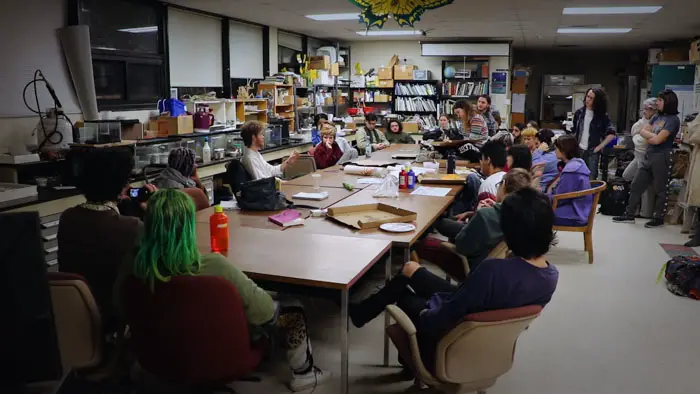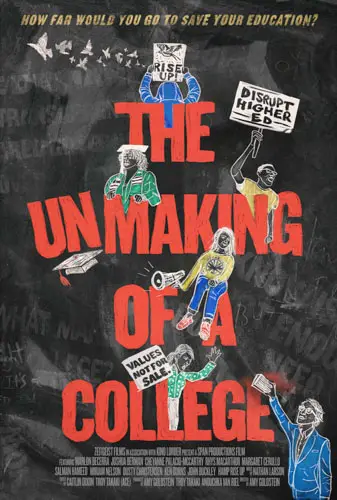
The students of Hampshire College take to the admin offices and the buildings, launching the largest sit-in protest in college history. Their chants of “Whose school? Our school” ring out over the campus. The student occupation directly responds to the recent announcement that the college may be on the brink of closing its doors forever. Perhaps worse than even bankruptcy is the risk Hampshire will partner with a massive public college, forfeiting the spark of identity that drew many students to the small school. Embodying the motto “To know is not enough,” director Amy Goldstein’s The Unmaking of College documents the 74-day sit-in and the ongoing fight for higher education.
A small liberal arts school in New England, Hampshire College is known for its unconventional curriculum and history of activism. Like a large corporation taking over a beloved brand or reprocessing a classic franchise, students fear the involvement of outside interests will rip the institute’s individuality from its very core. Challenging the student protest is newly appointed president Miriam “Mim” Nelson, who advocates for the college to cut costs at all costs. The struggle for student representation and transparent school decisions reaches a boiling point, leading the students to begin their 74-day protest.
The Unmaking of a College is a well-structured documentary. Writer Marlon Becerra leaves little out in terms of the raw facts, the alumni’s feelings, and the lengths people go to gain a voice. Footage of students organizing protests, debating administration, and faculty members discussing the system’s hypocrisy create a strong sense of unity within the interviews. In his segment, Ken Burns gives clear context to the bigger picture, while Margaret Cerullo provides insight into the daily struggles of those on campus at the time.

“…documents the 74-day sit-in and the ongoing fight for higher education.”
The film has a strong concept — an activist spirit with the mind of a scholar — and vital commentary on the current state of higher education. However, moments feel out of place in terms of pacing and focus. There are moments that feel almost like a college admissions commercial. I completely understand talking about a life-changing event that occurred at the college or because one was accepted to convey the students’ love for the school. But the way these sequences are structured shares more DNA with an ad on Youtube than a socially conscious movie.
Still, The Unmaking of a College does offer a unique perspective, existing inside the organized ranks of the protest. Primary camera operator, Joshua Berman, records the day-to-day of the sit-ins. The documentary gives a clear glimpse into the sleeping arrangements (the floor), shows students doing homework in the hallways, and generally what the life of a sit-in protestor entails. However, the biggest strength loses some of its zeal when Berman explicitly tells the audience how cool the protestor perspective is for the film and why this perspective makes this production unique. The moment feels too meta and borders on talking down to its audience.
While the credits roll, the screen fills with the classic “where are they now” text. As this played out, I felt informed but not moved. The movie is fine and speaks about an important issue facing the United States. But it loses its vision too often to end on a firm call to action. In the climax, The Unmaking of a College celebrates the victory of Hampshire College but neglects the larger war for higher education. Instead, opting for the “if Hampshire college can succeed, so can you” motto rather than speak to the national issues set up in the opening thesis. The film features several highs but ultimately too many lows to craft a compelling rallying cry.

"…features several highs..."


